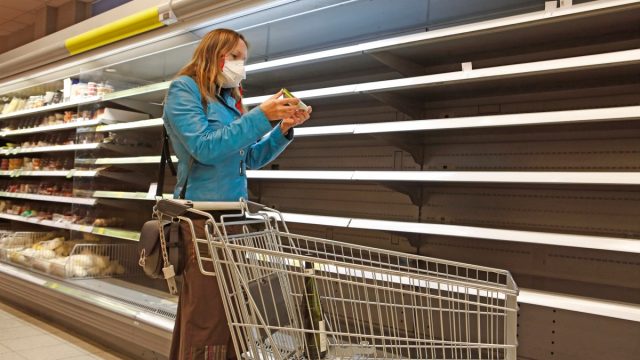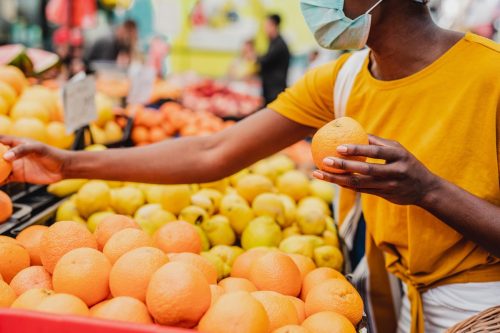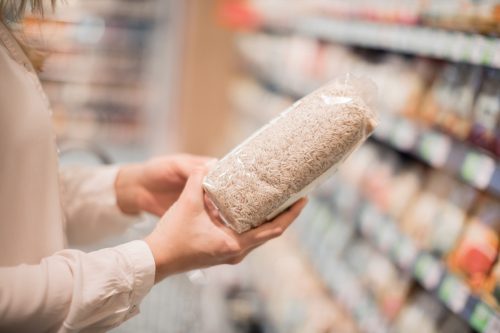All the Food Shortages Coming to Grocery Stores Soon, Experts Predict

From toilet paper to cleaning supplies, shoppers were rocked by major shortages in 2020 as a result of the pandemic and everything that came with it. But even as the COVID situation has improved, supply chain issues have continued, some with major consequences. Now, many experts are warning that we should prepare ourselves for several food shortages in the not-too-distant future. Read on to find out what you might not be able to find at your local grocery store.
READ THIS NEXT: 5 Warnings to Shoppers From Former Kroger Employees.
The U.S. has faced extreme weather in 2022.

Violent weather events have wreaked havoc on the nation this past year, including major floods, hurricanes, extreme heat, drought, and unusually large bouts of rainfall, according to USA Today. The National Oceanic and Atmospheric Administration (NOAA) reported that in 2022 alone, there have been 15 climate disaster events in the U.S., with losses exceeding $1 billion each.
That extreme weather has hurt harvests and devastated certain crops.
Erica Kistner-Thomas, PhD, a national program leader with the U.S. Department of Agriculture’s (USDA) Institute of Food Production and Sustainability, told USA Today that it’s becoming more difficult for farmers to adapt to the increasingly common weather extremes. “One year they’ll have the best year ever and then the next year they’ll be hit with a major flooding event or drought,” she explained.
The end result is food shortages, with more on the horizon.
Certain fruits are in trouble.

Citrus fruits were hit hard by extreme weather this year.
In October, the USDA warned that Florida’s orange crop production is likely to drop to record-low levels as a result of Hurricane Ian, NBC News reported. According to the USDA’s forecast, only about 28 million boxes of Florida oranges are expected to be produced this season—which would be the lowest level since 1943, and a 32 percent drop from the already-low production of 41 million boxes in 2022.
John Matz, a citrus grower in Wauchula, Florida, told USA Today that he lost more than 50 percent of his crops due to Hurricane Ian blowing fruits off of his orange and grapefruit groves. “It’s pretty disgusting to look at the amount of fruit that was on the ground,” he said.
Roy Petteway, president of the Peace River Valley Citrus Growers Association, said that subsequent issues from the hurricane are likely to lead to more trouble as time goes on. “Trees are very sensitive, they’re not like squash or cucumber,” Petteway told USA Today. “You might not see the full extent of the damage for eight months to a year.”
RELATED: For more up-to-date information, sign up for our daily newsletter.
You should be prepared for a major meat shortage.

Alongside fruit troubles, there’s also concern for meat. According to USA Today, beef production is walking a tightrope this year. Nationwide, beef slaughter is up 13 percent and in certain states like Texas—where major drought has hit—it’s up by 30 percent.
That might sound like a good thing, but those cows being slaughtered would normally end up producing calves in the near future. They’re being culled now, because there isn’t enough food for them to eat—and that will result in less beef down the line.
“There isn’t enough grass to eat and it’s become too expensive to buy feed. We’ve had a large amount of culling this year because of drought,” David Anderson, a livestock specialist at Texas A&M University, told USA Today. “We’re sending young female heifer cows to feed lots because we don’t have the grass to keep them.”
As Kistner-Thomas bluntly told the newspaper, “There’s going to be a shortage of beef and prices are probably going to go up.”
Rice has faced some struggles, but you should be spared a shortage.

One of the foods most affected by weather extremes in 2022 is rice.
The Sacramento Valley of California is one of just four regions that produce almost the entire U.S. rice crop. California is the main producer of both medium-grain rice and short-grain rice, according to the USDA. But as USA Today reported, the western part of the U.S. experienced its worst “megadrought” in 1,200 years in 2022, and that had a serious impact on farming in California.
Roughly 7 percent of California’s crops were not planted in 2022 because there was a lack of water for irrigation. Rice was the hardest-hit crop because it relies on surface water, resulting in more than half of the state’s rice acres going unplanted, according to the USDA.
Sean Doherty, a fifth-generation rice farmer from Colusa County, California, told USA Today that he was only able to plant four rice fields this year. In a normal year, he plants 20. “I’ve never experienced a year like this,” Doherty said.”There’s just no comparison to other years whatsoever.”
However, shoppers should have no problem finding rice on shelves. In a statement to Best Life from the California Rice Commission, a spokesperson said, “As harvest for the 2022 season in the Sacramento Valley has concluded, domestic rice supplies are more than sufficient and shoppers will continue to see California Rice, a grocery store staple, on the shelf.”
CORRECTION: Consumers will not experience an imminent rice shortage, despite extreme weather affecting rice production. An earlier version of this article misstated the risk of a rice shortage. Also, rice relies on surface water to grow. An earlier version of this article misidentified the kind of water required. We regret the errors.